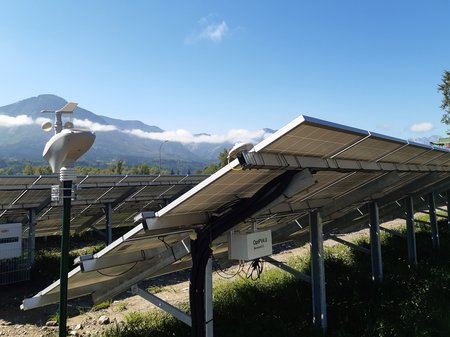The USE Lab will be Austria’s main research lab in the ubiquitous sensing domains tackling major research challenges including:
- Seamless integration in the environment
- Autonomous and networked data collection and information extraction
- Ease of usage, versatility, and dependability
The work will address both hardware and software aspects and particularly focus on model-based approaches for multi-sensor fusion, adaptive operation, auto calibration, self-diagnosis and methods for the fast development and verification of advanced sensor systems which include the exploitation of advanced signal processing and machine learning techniques. This involves basic and application oriented interdisciplinary research to offer industry accelerated market entrance possibilities for innovative ideas e.g., in the fields IoT (Internet of Things) and I4.0 (Industry 4.0).
University of Klagenfurt and Silicon Austria Labs GmbH are jointly establishing the Ubiquitous Sensing (USE) Lab and are seeking to make appointments for
four PostDoc Researchers/Senior Scientists with Doctorate (f/m/d)
for the following research tracks
- Track #1: Sensor Modeling, Simulation and Optimal Design
- Track #2: Sensor Signal Processing and Sensor Intelligence
- Track #3: Networked Sensing, Sensor Fusion and Virtual Sensing
- Track #4: Sensor Systems Integration and Fabrication
The minimum gross monthly salary for this assignment amounts to € 3.889,50 (14 installments/year., Uni-KV: B 1 lit. b, www.aau.at/uni-kv) and can increase in accordance with the provisions of the collective agreement in the case of consideration of previous occupational experience. The employment will be temporary until December 2023 (with potential extension), and will start as soon as possible. Applications can be send any time until the position for the respective track has been filled, but preferably before November 30th, 2020.
Duties and Responsibilities:
- Contributing to the research of the USE Lab in collaboration with national and international partners
- Contributing to the preparation of research proposals
- Student mentoring and assistance in PhD student supervision
- Participation in administrative and organizational tasks of the USE Lab
- Assistance in public relations activities of USE Lab
The four research tracks cover the following topics.
Track #1: Sensor Modeling, Simulation and Optimal Design: Model-based approaches for sensor development and optimization; Semantic representations and annotation of sensor data, novel concepts and theories for low power smart sensors and sensor networks including wireless communication, advanced signal processing and advanced pre-evaluation of sensor data with special focus on partially or fully autarkic operation; Realistic simulation environments for application driven energy management approaches on different integration levels inclusive communication and pre-evaluation of data (chip-, package- & system-level). Track leader: Prof. Hubert Zangl.
Track #2: Sensor Signal Processing and Sensor Intelligence: Sensor signals conditioning and signal pre-processing algorithms; Sensor signals compression for efficient signal transmission and communication; Machine learning approaches for modeling and reduction of uncertainties. Realization self-referencing and self-calibrating sensor systems; Methods for testing multi-sensor matrices in real applications. Track leader: Prof. Andrea Tonello.
Track #3: Networked Sensing, Sensor Fusion and Virtual Sensing: Resource-aware in-network processing and analytics of homogeneous and heterogeneous sensor data; Multi-sensor and multi-modal fusion; Self-calibration, self-organization and resource management in networked sensing systems; Methods for resource-aware data distribution and virtual sensing in sensor networks. Track leader: Prof. Bernhard Rinner.
Track #4: Sensor System Integration and Fabrication: Application of new materials in additive manufacturing sensor system integration and fabrication technologies of hybrid systems of chip & printed sensors, functional layers for ultrathin, flexible (bendable) sensors using additive manufacturing approaches, in particular inkjet printing; High-Resolution Electrohydrodynamic (EHD) and jetting technologies combined with 3D printing technologies; Integration of printed energy harvester and energy storage components; Polymers functionalized with nanomaterials such as carbon nanotubes, graphene etc.; Strain/stress and vibration sensors flexible humidity and temperature sensors. Track leader (int.): Prof. Hubert Zangl.
The USE Lab will be part of the Faculty of Technical Sciences at the University of Klagenfurt. The faculty was founded in 2007 and hosts the departments of information and communication engineering, computer science and mathematics, with about 30 professors. The USE Lab further contributes to the university’s key research strength "Networked and Autonomous Systems" covering various fundamental research topics as well as deployments in applications such as robotics and multi-UAV (Unmanned Aerial Vehicle) systems, smart grids, transportation and communication systems, and intelligent automation/production systems.
Silicon Austria Labs GmbH (SAL) has been founded in 2018 with the aim to become a top European research center for Electronic Based Systems (EBS). EBS are components, assemblies and devices with microelectronics and nanoelectronics, as well as embedded software. They are the technological backbone of digitization. In order to follow its mission and pursue cutting edge research for EBS and to address the arising challenges in this field, SAL has jointly established the Ubiquitous Sensing (USE) Lab together with University of Klagenfurt.
Required Qualifications:
- Doctoral degree in electrical engineering, physics, information and communications engineering, computer science or related field with excellent academic success
- Proven knowledge and extensive experience in the respective field
- High quality scientific publications in the field of the position
- Fluent spoken and written English skills
- Social and communication skills and ability to work independently
Certificates etc. with respect to recruitment conditions have to be provided at least 14 days before the scheduled start of the employment.
Additional Qualifications:
- Scientific publications in highly ranked journals.
- Experience and/or interest in the topics of at least one of the research track
- Experience in academic teaching and student supervision
- Experience in writing research proposals
- Knowledge of German.
The University of Klagenfurt intends to increase the number of women on its faculty, particularly high-level positions, and therefore specifically invites applications by women. Among equally qualified applicants, women will receive preferential consideration. People with disabilities or chronic diseases who are qualified are explicitly invited to apply.
General information can be obtained on this website www.aau.at/en/jobs/information. Additional information about the Ubiquitous Sensing Lab can be found on this website use.aau.at or by contacting Professor Hubert Zangl (hubert.zangl@aau.at, Tel.: +43 463/2700-3562).
The applications have to be sent in electronic format to use-recruiting@aau.at, including a reference to one of the four tracks. The application must include the CV, PhD thesis, list of publications, any certificate that can prove the qualifications. In addition, a one-page letter of presentation and the explicit indication of the research track position the candidate applies for.
The University of Klagenfurt will not reimburse applicants’ travel and lodging expenses incurred as part of the selection and/or hiring process.







